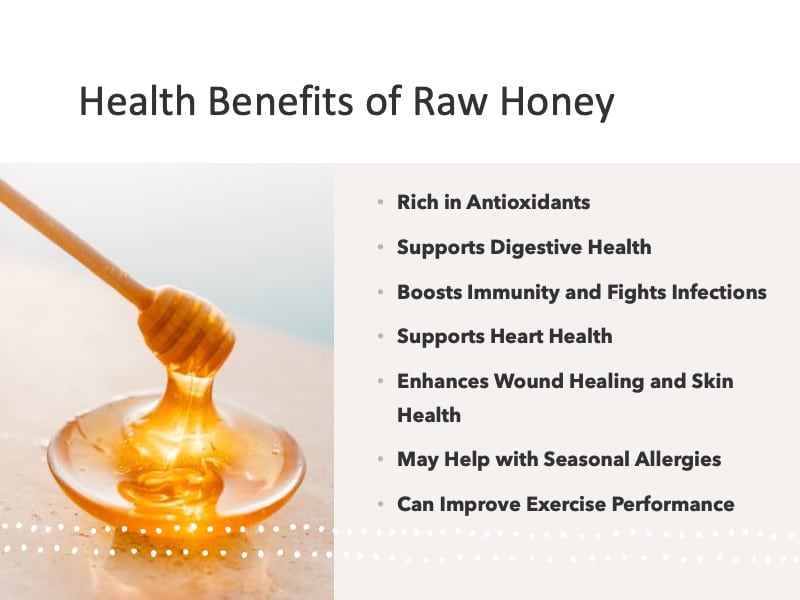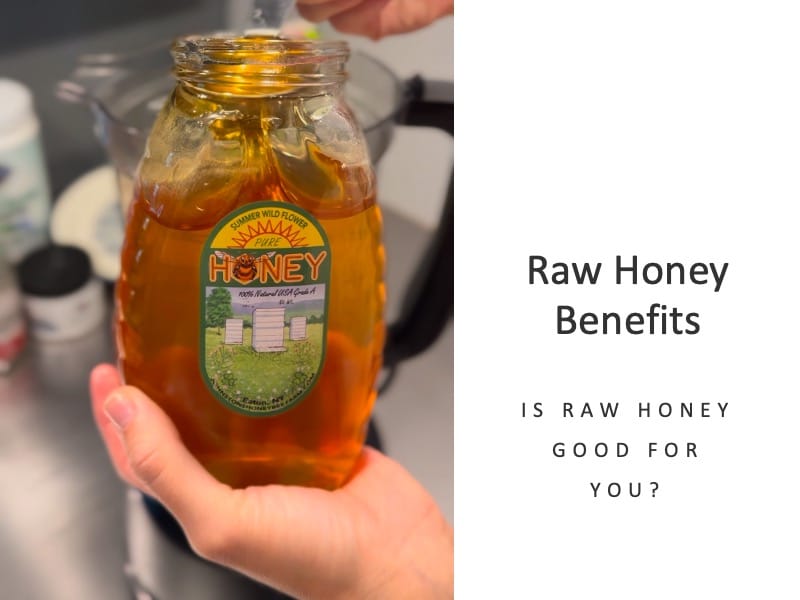Raw Honey Benefits: Is Raw Honey Good for You?
Raw honey is a powerhouse of natural nutrition, packed with antioxidants, enzymes, and bioactive compounds that offer a wide range of health benefits.
Unlike processed honey, which undergoes heating and filtration that can strip away key nutrients, raw honey retains its full nutritional profile, making it a superior choice for those seeking natural wellness solutions.
Scientific research has demonstrated its potent anti-inflammatory, antimicrobial, and antioxidant properties, which support immune function, promote digestive health, and contribute to overall well-being.
Important: Infants and babies under one year old should never consume raw honey or any honey, as it can contain Clostridium botulinum spores, which can lead to infant botulism—a rare but serious condition that affects the nervous system. This can lead to muscle weakness, poor feeding, constipation, lethargy, difficulty breathing, and even paralysis in severe cases.
Keep reading to discover all the incredible benefits of raw honey and how it can enhance your health.
What Is Raw Honey?

Raw honey is honey in its purest form—unprocessed, unheated, and unfiltered—directly sourced from the hive.
Unlike commercial honey, which is often pasteurized and filtered to improve shelf life and appearance, raw honey retains all of its natural nutrients, including enzymes, antioxidants, and beneficial compounds like pollen and propolis.
Because it is not subjected to high temperatures or excessive filtration, raw honey preserves its full range of health benefits, making it a superior option for those seeking a natural, nutrient-dense sweetener.
It can vary in texture, color, and flavor depending on the floral sources from which bees collect nectar, but its richness in bioactive compounds remains consistent across different varieties.
However, while raw honey offers numerous health benefits, it’s important to consume it in moderation, as it is still a form of sugar.
Excessive sugar intake—even from natural sources—can lead to blood sugar spikes, increased insulin resistance, weight gain, and a higher risk of metabolic disorders like type 2 diabetes and heart disease.
Although raw honey has a lower glycemic index than refined sugar and provides additional nutrients, too much can still contribute to these health risks if not consumed within a well-balanced diet.
Raw Honey vs. Regular Pure Honey – What’s the Difference?
While both raw honey and regular pure honey come from the same source—bees—their processing and nutritional content set them apart.
Raw honey offers superior health benefits due to its natural state, while regular pure honey is more processed for convenience and aesthetics. If you’re looking for maximum nutritional value, raw honey is the better choice.
Raw Honey
Raw honey is completely unprocessed, unheated, and unfiltered, meaning it retains all of its natural nutrients, including antioxidants, enzymes, pollen, and beneficial compounds like propolis.
This preserves its full health benefits, including antimicrobial, anti-inflammatory, and immune-boosting properties. Raw honey often has a thicker texture, may crystallize over time, and varies in color depending on its floral source.
Regular Pure Honey:
Regular pure honey, while free from additives, often undergoes pasteurization and filtration.
Pasteurization involves heating honey to high temperatures to improve its shelf life and prevent crystallization, but this process also destroys many of its beneficial enzymes and antioxidants.
Filtration removes pollen and other natural compounds, making the honey clearer and more visually appealing but less nutritionally potent.
At What Temperature Does Raw Honey Lose Its Benefits?
Heating honey above 104°F (40°C) can degrade its beneficial enzymes and reduce its antioxidant properties.
To retain its full health benefits, it is best to consume raw honey at room temperature or mix it into lukewarm liquids.
How Much Raw Honey Per Day for Health Benefits?
The recommended daily intake of raw honey varies depending on individual health goals.
Generally, 1-2 tablespoons per day is considered a healthy amount that provides antioxidant and anti-inflammatory benefits without excessive sugar intake.
Health Benefits of Raw Honey

Raw honey is more than just a natural sweetener—it’s a powerhouse of health-boosting compounds.
Packed with antioxidants, antimicrobial properties, and essential nutrients, raw honey supports immune function, promotes digestive health, and even aids in wound healing.
Its unique bioactive profile makes it a valuable addition to a balanced diet, offering benefits that go beyond simple nutrition.
Rich in Antioxidants
Raw honey contains polyphenols, flavonoids, and organic acids that help fight oxidative stress and reduce inflammation (Palma-Morales et al., 2023).
Antioxidants play a crucial role in preventing chronic diseases such as heart disease and certain types of cancer.
Supports Digestive Health
Raw honey acts as a prebiotic, promoting the growth of beneficial gut bacteria. It can aid in digestion and alleviate symptoms of gastrointestinal disorders like acid reflux and bloating.
Studies have also shown its potential role in balancing the gut microbiome, which is essential for overall health (Xiong et al., 2023).
Boosts Immunity and Fights Infections
Due to its antimicrobial properties, raw honey is effective in combating bacterial infections.
It has been used as a natural remedy for sore throats, coughs, and wound healing for centuries.
Manuka honey, in particular, has shown strong antibacterial activity against various pathogens.
What Are the Health Benefits of Consuming Raw Honey When Sick?
Raw honey is particularly beneficial during illness due to its soothing, antimicrobial, and immune-boosting properties.
It can help relieve sore throats, reduce cough severity, and speed up recovery from colds and flu.
Supports Heart Health
Research suggests that consuming raw honey may help reduce risk factors associated with cardiovascular diseases, such as high cholesterol levels and inflammation.
A study analyzing multiple clinical trials found that honey consumption can improve lipid profiles and reduce oxidative stress (Samarghandian et al., 2017).
Enhances Wound Healing and Skin Health
Raw honey has been widely studied for its ability to promote wound healing. It is particularly effective for treating burns, ulcers, and various skin conditions, including psoriasis and eczema (Mohammed, 2022).
The application of raw honey to wounds helps accelerate tissue regeneration and reduce inflammation.
May Help with Seasonal Allergies
Raw honey may offer relief for seasonal allergies by acting as a natural form of immunotherapy.
Since raw honey contains trace amounts of pollen from local plants, consuming it regularly may help desensitize the immune system to allergens over time.
This concept is similar to how allergy shots work—by exposing the body to small amounts of allergens, the immune system gradually builds tolerance.
A randomized controlled trial published in the International Archives of Allergy and Immunology found that individuals who consumed birch pollen honey experienced 60% fewer allergy symptoms, twice as many symptom-free days, and used 50% less antihistamines compared to those relying solely on medication (Saarinen et al., 2011).
Another placebo-controlled study conducted in Malaysia showed that participants who ingested high doses of honey daily saw a significant reduction in allergic rhinitis symptoms, with benefits lasting even after stopping consumption (Asha’ari et al., 2013).
Although more research is needed, these findings suggest that raw honey—especially when sourced locally—could serve as a complementary approach to managing seasonal allergies.
Can Improve Exercise Performance
Raw honey is a natural energy source that can enhance athletic performance by providing a steady release of fuel for muscles.
Unlike refined sugars, which cause rapid spikes and crashes in blood sugar levels, honey contains isomaltulose, a low-glycemic carbohydrate that promotes sustained energy release and improves endurance (Maresch et al., 2017).
A systematic review in Nutrients (2019) found that honey supplementation before or during exercise provides similar performance benefits to commercial sports drinks, while also supporting immune function and reducing post-exercise inflammation.
Another study in Sports Medicine & Health Science (2021) reported that honey consumption reduces exercise-induced fatigue by lowering inflammatory cytokines and oxidative stress markers.
Additionally, research has shown that honey can enhance recovery by promoting glycogen replenishment in muscles post-exercise.
This makes it a valuable natural alternative for athletes looking to maintain steady energy levels, improve endurance, and recover faster without relying on synthetic sports supplements.
I’ve personally made my own sports drinks by mixing raw honey with electrolyte tablets to avoid the excess sugar in Gatorade and other high-sugar sports drinks, and I love both the flavor and the sustained energy they provide for my workouts.
Final Thoughts: Is Raw Honey Good for You?
Raw honey is more than just a natural sweetener—it’s a nutritional powerhouse packed with antioxidants, enzymes, and bioactive compounds that support overall health.
From boosting immunity and aiding digestion to enhancing exercise performance and potentially reducing seasonal allergy symptoms, raw honey offers a range of science-backed benefits.
Unlike processed honey, it retains all of its natural nutrients, making it a superior choice for those looking to maximize their health.
Whether you use it as a natural energy source, a soothing remedy for sore throats, or a daily wellness booster, raw honey can be a valuable addition to a healthy lifestyle—just remember to consume it in moderation.
This website does not provide medical advice. This website site does contain affiliate links, and purchases may earn a commission.
Read my Medical Disclaimer, Review Disclaimer, and Publishing Policies for more details. Use of this site indicates acceptance of these terms.



